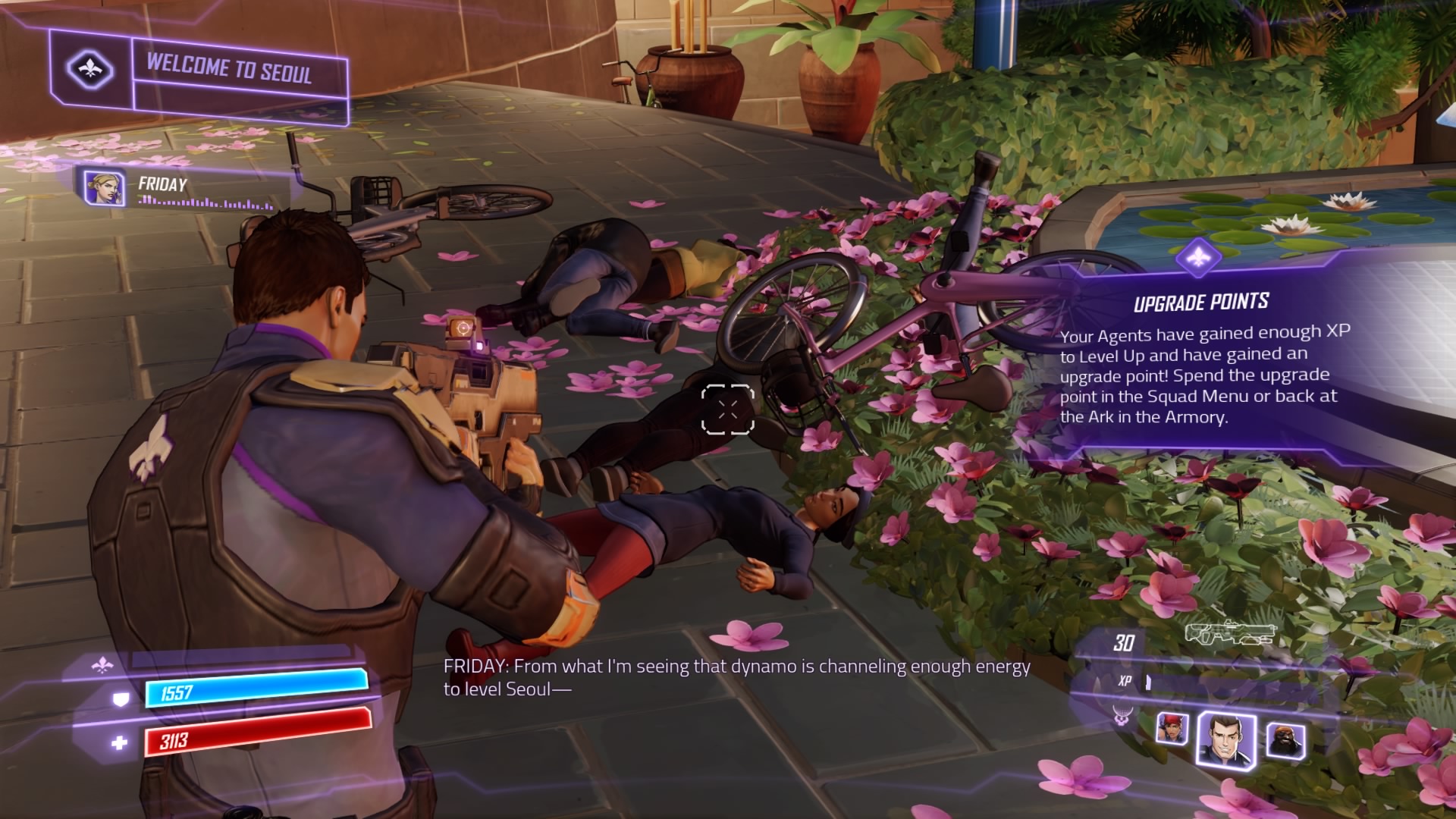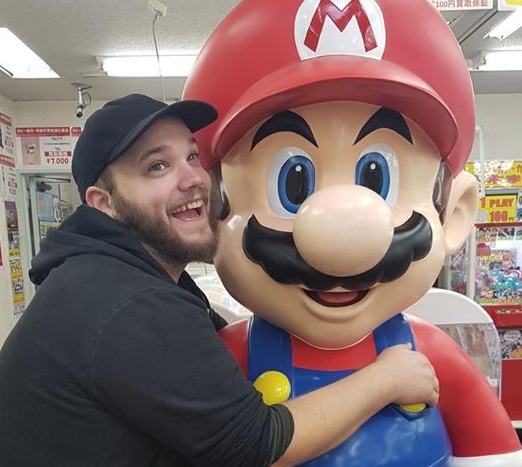
Can you believe that Agents of Mayhem (AoM) has been in development since Saints Row IV was finished? Because I sure don’t. How has this game been in development for four years, basically stealing Saints Row’s design as a base, while still turning out to be so shockingly mediocre? AoM is meant to be about cartoon style heroes and villains but couldn’t be more boring if it had actually set out to make that genre as dull as possible. Considering the amount of experience that Volition has had in making this kind of sandbox style game, this is honestly a pretty disappointing outcome. Buckle in, readers, as I regale you with stories you’ve probably heard before but about a game that should have been so much more than it is!

Excelsior!
An indirect sequel to the Saints Row series by way of Gat Out Of Hell’s “Recreate Earth” ending, AoM takes place in a freshly minted Earth courtesy of the gang formerly known as the 3rd Street Saints. Players take control of agents in MAYHEM, a super-agent organisation created to take on LEGION, a group of your average super-genius-but-still-somehow-bumbling-idiots who’re dominating the planet. The story, setting, and characters are meant to be a take on Saturday morning breakfast cartoons through the lens of Saints Row style humour. AoM doesn’t fully embrace this idea, however, clinging too hard to the trappings and tropes of its spiritual predecessor. They even use the Saints’ logo for God’s sake, and at no point is that ever explained.
The number of player characters is ridiculous, and this game simply doesn’t have the longevity for anyone to become familiar with them all. Likewise, the villains are mostly forgettable and miss many opportunities to be the sort of flamboyant, larger than life personas that you’d expect from a game of this theme. There are no different gangs, organisations, or enemy flunkies unique to a particular villain; just the same jump-suited goons and the next flavour of the hour. To this end, the game is also linear regarding story progression, forcing you to do the story missions in a particular order. You’d think in a big, open city sandbox that you’d be able to take on anyone in any order. It turns out that this is the one time that they really embraced the theme, and they did it by making the story episodic.

“Don’t worry, dead innocent bystanders, I’ll make sure that we never take advantage of situations like me killing you to make a decent joke!”
AoM is a collection of excellent ideas that haven’t been connected to each other so much as they’ve been angrily bashed together by an enraged baboon. All the lessons that should have been learned from the Saints Row series about how a sandbox game should function have not been applied to AoM. It’s like they listed a bunch of ideas they liked and then didn’t think about whether they’d overlap, or how these ideas would work together. There’s also a problem with there being both too much going on, and not enough. I’ll go into more detail about what I mean with that but suffice it to say that Agents of Mayhem’s design is far less than the sum of its parts.
Instead of taking advantage of the already sizeable city-scape that’s been created, enemy lairs have been put in underground bunkers that all look suspiciously similar to one another. The hacking mechanic, which is heavily overused, is just a wheel with a spinning indicator, and all that’s required of the player is to press the button at the right time. You’ll trip over side-missions everywhere you go but they all amount to doing much the same thing: hack consoles, blow up boxes or panels, or kill everyone. If you’re lucky, you’ll find a mission where there’s a combination of all three. There’s no nuance to what you do in any given mission, and the story isn’t compelling enough to carry the same three objectives as far as AoM wants to take them.

And it wants to take them pretty damn far.
Combat is by far and away the biggest focus of AoM, which is an issue because the game has its share of problems in that regard. The enemy AI, for starters, is dumber than a sack of potatoes. Grunts will constantly bolt around like Jack Russel Terriers, as though they’re unsure of where they’re meant to stand. Stronger enemies have stood perfectly still while I’ve peppered them with bullets, only acknowledging my attacks by falling over dead. You stop feeling like a hero when it seems like you’re fighting the Special Education’s 231st Battalion. There’s also not a whole lot of variety in how each enemy behaves. None of their attacks dramatically change the course of battle to a point where you have to change characters to deal with them.
Having three characters to switch between is also a great idea that isn’t fully utilised. There’s an extensive roster of characters that can be unlocked throughout the game, but the difference between them all is negligible at best. Some are better at breaking shields, some are better at taking down enemy health; Hardtack is good at both. Since there’s nothing essential that any one character can do over the others, there’s really no reason to switch from Hardtack, whose shotgun is stupidly powerful and kills everything. He’s a shotgun wielding, nonsense spewing cyclops that can kill anything and carries a spear – why would I change from that? It would have been better if the roster of twelve characters had been reduced to three, with well-defined roles, and a larger variety of upgrades to choose from, actually giving the other characters a reason to be there. At the moment, they’re basically just extra lives before game over.

Hahaha, oh Hardtack – you genuinely frighten me. What does that even mean?
Unlike Saints Row’s fictional city of Steelport, AoM is set in a near-future version of Seoul, Korea. You’d be forgiven for not recognising the city, however, since Volition’s idea of the Seoul of the future is a neon-chrome coated version of Steelport. In fact, were it not for the fact that four games spent in Steelport seared the city’s layout into my brain, I would have believed that Volition had recycled the map yet again. It’s entirely unremarkable in its appearance, and the game even knows it; it certainly isn’t expecting you to keep it memorised. Massive pink, flashing arrows appear on the roads, walls, and mid-air directing you toward whatever the way point is set. There’s no mini-map, and the world-map is just an explosion of mission icons against a road network that doesn’t even need to be there.
You’ll come to hate this city as well, because despite your role as super heroes you’ll never feel like you’ve bested or mastered the landscape. There’s no super-speed, no leaping buildings in a single bound, no jets; just your two hooves, a powerup that’s akin to fast-acting meth, and some cars. The cars get you around fast enough, but you’re still restricted by the roads, or just wherever your vehicle will fit, and there are plenty of collectables still hidden on the roofs of buildings and other hard to reach places. In other words, you’re given a multi-levelled environment with some motivation to explore it but hardly any methods with which to do so. Jesus, Volition, did you forget that you could fly in Saints Row IV, basically from the beginning of a game that wasn’t about superheroes?

Doesn’t exactly scream “hero,” does it?
The “hero and villain cartoon” theme was clearly at the heart of this game at one point. The characters all wear matching uniforms, for instance (though, as mentioned before, this isn’t always a great thing), there’s a theme song, and even the visuals were adjusted to suit. There’s this vector-comic style to the game’s models that, if you take the time to look closely, looks really good. You have to take the time, at a point where you’re not doing anything, because almost any action floods the screen with a particle effect disco, obscuring everything. Your characters will die off before you realise what’s happened because the action on-screen distracts from damage feedback effects. It’s hard to notice the sides of the screen pulsing red when the entire screen is lit up like a fireworks display.
What AoM lacks in depth it attempts to make up for in jokes, and if the game had been given a proper sense of direction, I think they might have gotten there. After whoever wrote this ran out of tired and stereotypical dialogue from similar media, it seems like they leaned on their own creativity and actually came out with some funny stuff. There are short moments when transitioning from your home base to the game world, for instance, where random characters will parody the G.I. style Joe PSAs. Most of these are hilarious, and it’s this kind of humour that the game should have focused on. Instead, you’ll more often get the likes of Hardtack yelling things like, “You want me to fuck it up, don’t you? Don’t you?” every time he activates his special ability.

It really should have been more stuff like this. A lot more.

I’ve compared Agents of Mayhem to Saints Row a lot in this review, and perhaps some of you reading might think that unfair. I think it’s entirely appropriate, however, since at their core they are essentially the same game, and there’s even some canon crossover happening between the two. Agents of Mayhem is just a stripped down Saints Row with less charm and character, less willingness to embrace its own silliness, and dreams of being something like Crackdown. There are too many player characters with not enough customisation, and little point to there being so many for the lack of unique content in this title. Well done, Volition, you spent four years making a terrible version of one of your most beloved franchises. Please don’t do this with whatever comes next for Saints Row.











